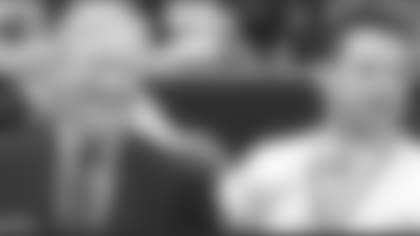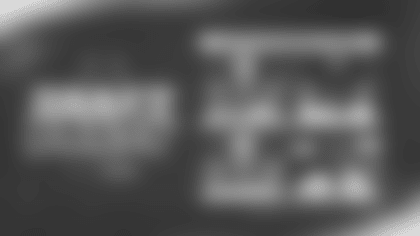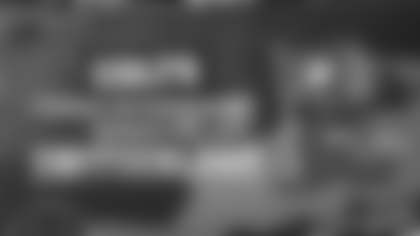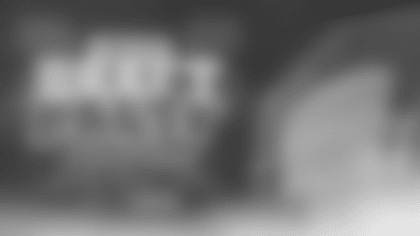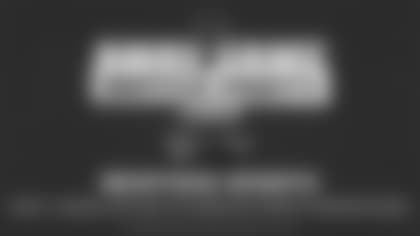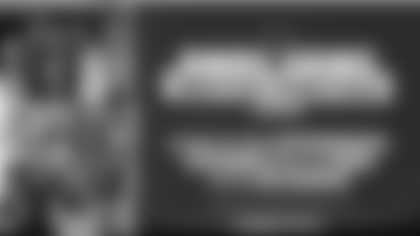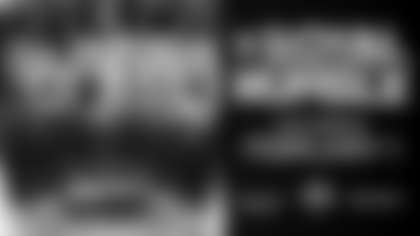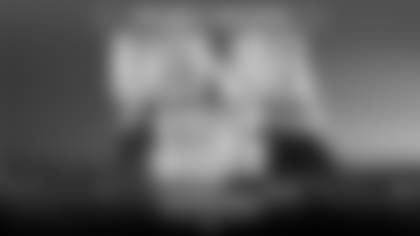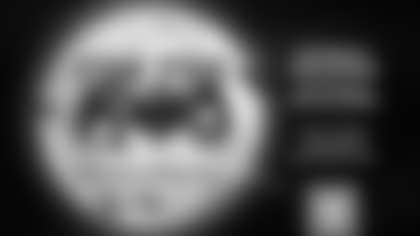The Polian Corner, Week 12, Chargers at Colts
Bill Polian, in his 13th season as Colts president, has a resume unique in the NFL. The only man to win NFL Executive of the Year six times, Polian in the 1980s built the Buffalo Bills into a four-time Super Bowl participant. In the mid-1990s, he built the expansion Carolina Panthers into a team that made the NFC Championship Game in its second season, 1996. Since joining Indianapolis in 1998, he built the Colts from a 3-13 team in 1997 and 1998 into one that has made the playoffs 10 of the last 11 seasons, including AFC Championship Game appearances after the 2003, 2006 and 2009 seasons, AFC South titles in 2003, 2004, 2005, 2006, 2007 and 2009, Super Bowl appearances following the 2006 and 2009 seasons and a Super Bowl championship following the 2006 season. Each week during the season, in The Polian Corner, Polian and Colts.com will discuss issues pertinent to the Colts and the rest of the NFL.
Q: A 31-28 loss to the New England Patriots Sunday. A lot of people out, still, but another memorable game between the teams. If you didn't care who won, a great game once again . . .
A: A number of people have said that to me, including some strangers. I'm sure it got a great rating. People obviously were thrilled by the game. I'm very proud of our players for the effort that they made. We came up a little short, but we have to put it behind us. There has been a lot of discussion and a lot of focus on it, but for us, it has to go behind us immediately. In fact, it should be behind us now. Let's get on with the job of playing San Diego. Let's get on with the job of hopefully getting some injured players back. Let's get on with the job of hopefully playing better than we played Sunday. There are areas where certainly we can improve, and the most important game is the next one. The bottom line is win, lose or draw, this race is going 17 weeks and 16 games. We have to concentrate on the next game as the most important one. This was a great effort. We came up short. That's just the way it is, so let's move on.
Q: Any idea about wide receiver Austin Collie's situation moving forward?
A: We'll see. He was uncomfortable, I guess is the best way to describe it. It may go later in the week. We're going to err on the side of caution, as we did Sunday. Obviously, we missed him, but that's the way it goes. We'll see how the week plays itself out.
Q: Blair White came off the bench and played very well in Collie's place . . .
A: He could not have played any better than he did, because he played tremendously well. We did everything we needed to do to win the game. It's just unfortunate that that kind of an effort went unrewarded. He was one of many who really stood out and did a heck of a job. Unheralded players step up and do well. In our system, it is, 'Next Man Up,' and it is based not upon where you're drafted or what your pedigree is, but what you do to earn a spot on the team and what you do to prepare yourself. Blair White is a perfect example of that and Thank God we have him.
Q: Talk a bit about the three phases. There seemed to be some solid adjustments made at times.
A: Offensively, in the passing game, we did a heck of a job from start to finish. We had to block them, particularly in the passing game, and we did. That's a great credit to our offensive line. That's a fearsome rush line and they played a lot of different fronts. They played a 3-4 front. They played a two-down lineman front. They played a four-down lineman front. They made it a little difficult on us and we held our own – particularly (left tackle) Charlie Johnson, who drew (linebacker Tully) Banta-Cain. We thought that would be the match-up and Charlie did a terrific, terrific job. That part of it was great. I would say we won that battle over four quarters. The running game, we didn't get anybody blocked in the first half. To (Offensive Coordinator) Clyde Christensen's credit, we came out in the second half and said, 'We're going to run the ball. We're going to do our best to run the football and even if we get two yards or three yards, we're still running the football, and we're going to get positive yardage.' As you saw, the two yards and three yards became 36 yards and 15 yards when you took the mindset of, 'Hey, we're coming after you.' There's no question I think we wore them down in the second half. That was a great adjustment and a great commitment on Clyde's part and on (offensive line coach) Pete Metzelaars' part to run the ball and a great job by (running backs) Donald (Brown) and Javarris (James) running it. On the defensive side of the ball, we certainly picked it up in the second half, without question. That included not only playing the pass well, which I thought we did pretty well all game, but we shut the run down pretty well in the second half. We did a decent job of it. On special teams, we kicked the ball exceptionally well. Pat (McAfee) punted well and he kicked off really well. The coverage was not great and penalties were just terribly hurtful, and that's an area we're going to clean up. We gave our offense a long field three out of four possessions in the first half, if I'm not mistaken. We said, 'You can't lose that decisively,' and we did. The good news is we can clean that up. That's a technique issue. We can clean that up, but I thought we did a heck of a job in the critical areas that we needed to. Really, what the game boiled down to was an errant throw at the end. It's one of those situations where you say, 'If it had been Dallas (Clark) in there or if it had been Austin in there or if it had been Gonzo (wide receiver Anthony Gonzalez) in there, maybe we get a little more continuity. I think I would chalk it up to that and that's the break of the game, but a great credit to our guys for fighting as well as they did. We could have easily thrown in the towel. No question about that, especially on the road in those conditions. Secondly, we kept our poise throughout. They got a critical 15-yard penalty. That was a thing we said, 'Don't give them any gifts,' and we didn't really, except in the kicking game. It came back to play in our favor.
Q: Can you update the status of Colts safety Bob Sanders?
A: It's going quite well. We're going to get an idea on where he is from a conditioning standpoint in addition to the rehabilitation. We're going to try to get an overall assessment of where he is. Our hope is we can get him out on the practice field relatively soon. I don't have a date certain on that. We'll probably know more by the end of the week, but right now, everything is progressing positively. Our hope is he'll be out there fairly soon. We thought he'd be back before the end of the season and that he could contribute down the stretch. He volunteered that as a matter of fact, that he thought he could have been ready to play in the Super Bowl game last year. So, this injury occurred in a time frame earlier in the season. So, we held a spot. We held him inactive all season despite the stress on the roster expecting there will be a point where he does come back and is able to help us.
Q: There was a play near the end of the first half where a Patriots player fielded a kickoff and took a knee, stopping the clock. Can you explain the rule?
A: It's an antiquated term called, "crying down," which I guess in the early stages of the game you would actually kneel down and yell, "Down." You could no longer advance the ball. You could not be touched or tackled and the play was over. The clock is stopped when that occurs.
Q: Can you talk about the decision to play Jeff Linkenbach over Mike Pollak at right guard?
A: That's a good question and it's one we discussed at length, both two weeks ago and last week. It was the feeling of the offensive line coaches that we weren't getting quite the cohesion we needed at right guard, principally in the passing game. So much of what we do is predicated on the passing game. They thought because Link is taller and longer-armed that perhaps he would provide a better answer for us in there in terms of pass protection. Not that Mike was doing a bad job, but we weren't picking up stunts as well as we should. We were getting some penetration in some situations in the passing game, and of course, when you get penetration at guard, it's coming right at the quarterback right now. The feeling was Link would do a better job. Mike still figures very prominently in our plans. Whether it's at guard or center going forward is really immaterial at this point. We think Link is doing a good job and will get better, but Mike is far from a forgotten man. Let's hope that there aren't any injuries, but if there are, he would be right back in there.
Q: Can you go over some more critical aspects of Sunday's game?
A: I thought the penalties on special teams were extremely hurtful. That's something we need to work on and clean up. The good news is we can. We did not do a good job stopping the running game. That's what ultimately hurt us. One of the things you need to do (against the Patriots) is figure out how they're attacking you, because the Pats will not give you the same offensive attack and they will not give you the same defensive scheme two games in a row. It will be entirely different from year to year or from game to game based on how they see your personnel at the time. We did a very nice job in the second half of adjusting to their running game and basically shutting it down. In the first half they basically had their way with us. In the second half, it was a different story.
Q: Just when you thought there was no more Kevin Faulk, Danny Woodhead seems to give the Patriots the same element.
A: That's exactly right. He does it exceptionally well. They know how to operate their program. That's why they and we have won the most games in this decade in the National Football League.
Q: Can you explain the approach to the decision to keep the roof at Lucas Oil Stadium open or closed?
A: The bottom line is we can play anywhere. The decisions on the roof are based on two major concerns. No. 1 is precipitation of any kind. The field does not have any drainage on it. As a result, if there is any precipitation in the forecast, we have to keep the roof closed because you could get into a situation where the field would have some real difficulty. Secondly, and this is (Colts Chief Operating Officer) Pete Ward's bailiwick more than mine, but there are weather extremes that cause issues, particularly on very sunny days for one o'clock games. You can have the temperature at 80, 82 or 85, and there are certain folks that suffer pretty heavily with that. They have to make a decision based upon comfort for a fair amount of fans. There is no issue with wind. We don't take that into consideration at all. The lower end of the spectrum with temperature is certainly above 30. I can't quote you what it is off the top of my head. It's pretty reasonable, but the biggest area for us is to worry about precipitation.
Q: Are the Colts going away from the hurry-up offense this season? And if so, why?
A: We were up-tempo the whole second half (Sunday) and boy, did it ever work. We wore them down and it's pretty clear that up-tempo attack is something that works in our favor, particular there. That's strange in Foxboro, where crowd noise is an issue and weather can be an issue. It was a beautiful day for football Sunday – a little chilly in the evening. Not terrible. We were up-tempo most of the second half and with good success. It certainly is a staple of our attack. Now, it doesn't work against every team. But there are some teams where it works better than others, and obviously in the second half Sunday it was.
Q; Can you discuss the coaching change in Minnesota? Brad Childress is out as head coach, and Leslie Frazier – a former defensive assistant under former Colts Head Coach Tony Dungy – is taking over . . .
A: In the interest of full disclosure, I must say my youngest son, Dennis, is an administrative assistant to the head coach at Minnesota. I'm sure it's a sad day for him, because he was very close to Brad, but he's also close to Leslie. I'm sure they all will devote their full attention to trying to give Leslie the best chance he can to succeed. He's very deserving. I'm sorry to see Brad go. In many ways, I think all of the things that have happened to him are the result of a lot of noise in the media that perhaps didn't match up in other places. But when you don't win, unfortunately, those things have a way of coming back to cause harm. The bottom line in our business is you have to win. It's unfortunate. Brad's a good coach. He's a wonderful person, and I'm sure he'll surface back in the National Football League soon. Leslie is certainly eminently qualified – a great person. He was a great addition to our staff. He's a good friend to all of us that had the pleasure of working with him here and we wish him nothing but the best.
Q: Can you talk about the timing between Manning and wide receiver Pierre Garcon on Sunday?
A: That's kind of a microcosm of what it's like to play the Pats. We had a play-action pass called, so Peyton had his back turned to the line of scrimmage in order to make the fake. He anticipated that Pierre would run a go route right up the sideline. He anticipated that Pierre would get single coverage, because on the snap of the ball, the corner looked as though he was going to roll up and take the run fake. As Peyton executed the fake with his back to the secondary, the corner faked as though he was coming back, then walked back under Pierre and tried to run with him. Pierre correctly recognized that and cut the route short and was wide open by about 15 yards because the corner had to bail so fast – he was well beyond him. The safety had come over the top. Peyton, anticipating the nine route turned around and let it fly. You have to go on timing. It unfortunately was picked. Neither player was really at fault. What caused it? Great attention to detail on the part of the Pats, great execution on the part of the Pats. Score one for them. They pay attention to the details. They're on top of the little things. They do all of the little things right the vast majority of the time. They did in that situation. There was really no issue at all in terms of our execution. It was a matter of them making a better play than we did. The example of how you can be on the same page was on a throw in the fourth quarter for a first down on the Pats' side of the field. Pierre was just man-handled by the corner. They timed it up so perfectly that even though the corner was hanging all over Pierre, Peyton was able to put the ball in there and complete the pass. The more they work together, the better they'll be. The interception was not the fault of any one player on our part, but a great credit to execution on the part of the Pats.
Q: And the last interception was a big-time catch on the part of safety James Sanders . . .
A: It was a great catch, but it was nonetheless an errant throw. That's another example of working together and timing. Peyton is working with new receivers and in large measure, he's not sure how many of those individual match-ups they're going to win. Had it been Dallas out there, had it been Austin out there, had it been Gonzo out there, you probably get a little more certainty in terms of both cutting the route short if that's what's necessary reading the coverage and also in terms of the ability to break the route off and get open instantly. That's just a function of working together. In many ways it's a sad thing that we've had all of these injuries, but you try to compensate as best you can. Sometimes, the best-laid plans go awry, and that's what happened.
Q: There seem to be specks that fly up occasionally from FieldTurf? Is that ever a problem in terms of it getting in the eyes of players?
A: It can be from time to time. Every once in a while they may get a speck in their eye, and many of the skill position players have taken to wearing eye shields for that and other reasons – principally as a way to protect their eyes from finger pokes. It's not a major problem.
Q: There was a play in the game on which Garcon seemed to make a catch that was called a trap. Can you comment?
A: I have to tell you I don't remember it. There were so many critical plays in that game that that's one that doesn't come to mind. The one that does is the (Patriots wide receiver Wes) Welker reception where the Pats correctly – and again, another indication of how they take care of the little things – raced to the line of scrimmage and got the ball snapped before there would be a replay review. We felt from the vantage point we had the ball clearly had been trapped. We did not get a replay on television ironically enough, so I haven't gotten an update version of it. We all thought it was a trap and they did, too, because they got up and snapped the ball very quickly – to their credit.
Q: There seemed to have been a lot of injuries and a lot of hamstring injuries. Is there anything to be done to address that?
A: In terms of hamstrings, we changed out stretching program about a third of the way through the season and added some team stretching during the day. As we always do, we'll take a look at it at the end of the year and see what areas we can improve upon and what areas we want to tweak.
Q: Can you explain why Bob Sanders is still with the Colts?
A: No. 1, he's a great player when he's healthy. No one argues about that. When he's on the field, he is a force. That's one of the reasons he's still a Colt. Secondly, we feel he has much more left to contribute even this year. Our hope is that very soon he'll be back out there and contributing. No one questions if Bob Sanders is an impact player. He just has had a string of very tough luck in terms of injuries and hopefully, over time those things even themselves out. Hopefully, he'll come back and be the force he always is when he's on the field for the stretch run.
Q: Does it seem the Patriots are playing in a similar style to the Colts. It seems you're looking in the mirror when they have the ball?
A: I think that's true. I think there are a lot of similarities largely because both quarterbacks are so talented. You can do things with quarterbacks of that ilk that you can't do with very many others in the National Football League. Interestingly enough another guy who can do that is a gentleman we're going to play this coming week – Mr. (Philip) Rivers from San Diego. When you have those elite quarterbacks who can do a lot of different things you can go from three-wide formations and spread the field and have a misdirection running game, which both of those teams do largely because both teams are so great at it.
Q: The Chargers are playing awfully well once again . . .
A: They're playing good football. They have the No. 1-rated offense and the No. 1-rated defense in the National Football League. They have done a tremendous job of getting back in the hunt. The other clubs in their division certainly have helped them, but they're back in it with both feet with (quarterback) Philip Rivers and with their young rookie running back (Ryan Mathews) and with the return of (wide receiver) Vincent Jackson and others in their receiving corps – and of course, their great tight end (Antonio Gates) – they have the ability to move the ball almost at will. Defensively, they're an exceptionally good blitzing team and exceptionally good run-stoppers – not dissimilar to what we saw with the Pats. All in all, they're a very tough ball club. The only issue that we have perhaps going for us is they played Monday Night and they're going to be traveling on a short week. That was the least, I think, that the schedule-maker could do given everything else that he handed to us this year.
Q: Punter Mike Scifres and returner Darren Sproles are also always huge factors . . .
A: You had to mention those two – that's exactly right. They have had their problems on special teams this year, but they have mainly been in the coverage units. Scifres is absolutely outstanding and of course, we have seen more than enough of Darren Sproles to last us a lifetime. He presents an incredible challenge for our coverage teams. We talked about our special teams penalties. Part of that is due to the fact that people like (rookie linebackers) Pat Angerer and Kavell Conner are playing full time because of injuries. Those injuries, which require backup players to step in – Blair White is another – who are extremely valuable special teams contributors. They are now stepping in full time. That makes the load even tougher. It's something we have to adjust to, and we have to get better, but it's understandable as well.



